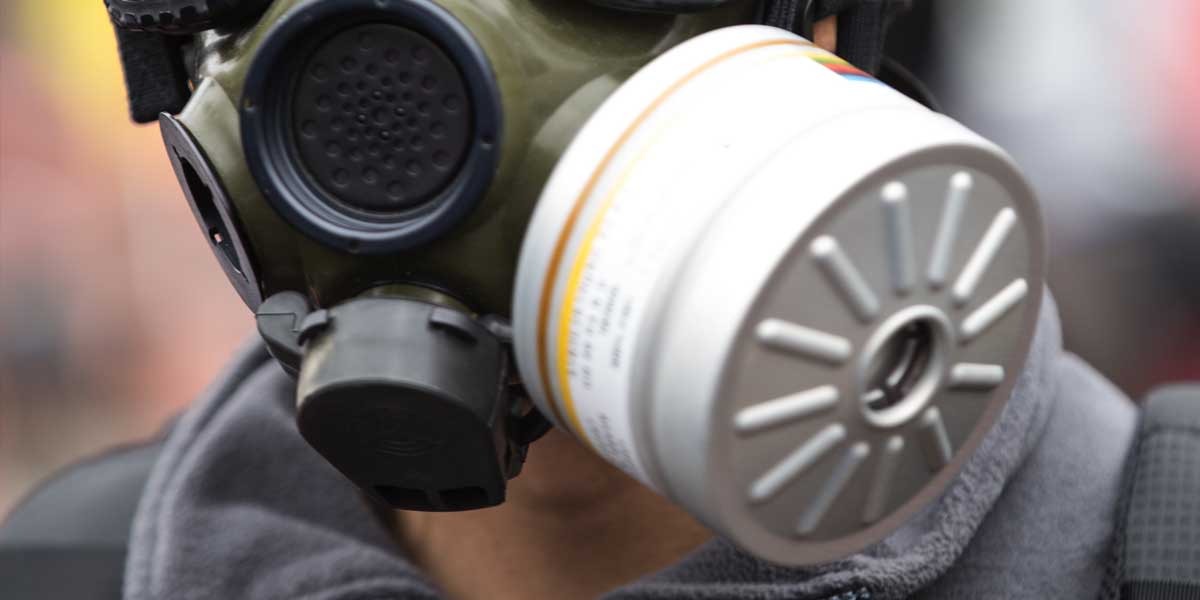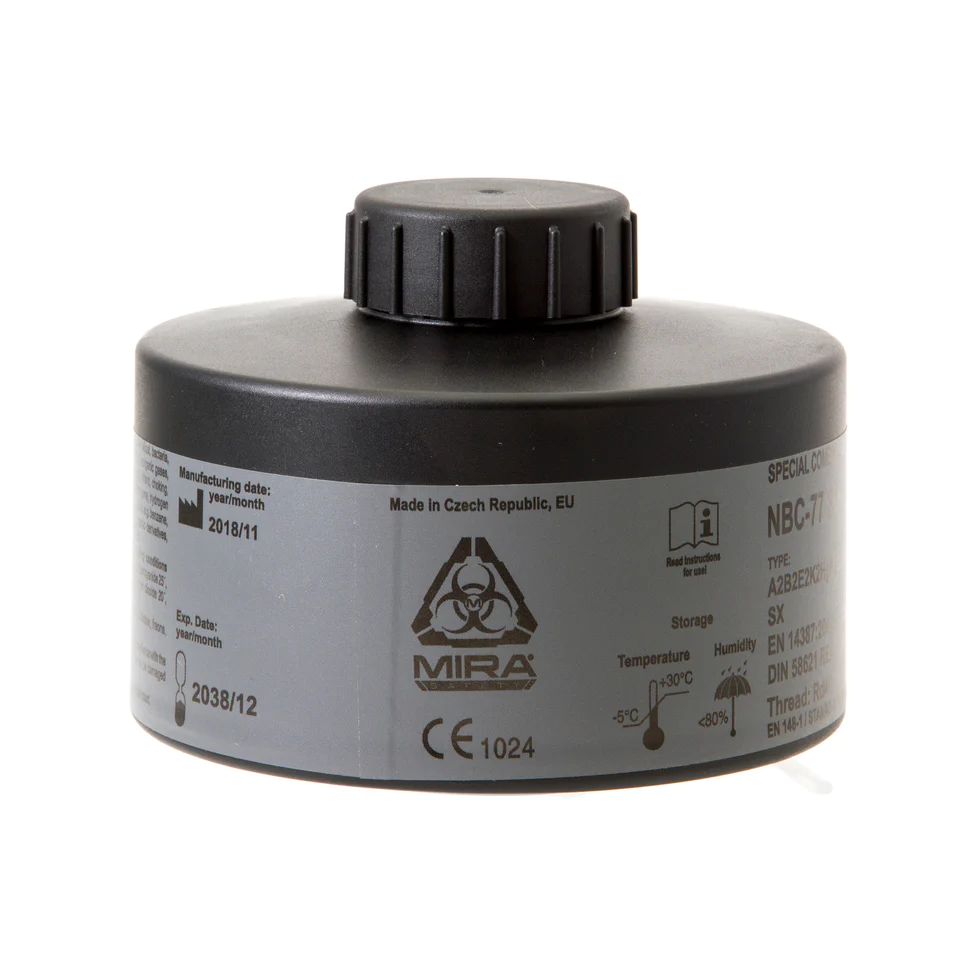Best Gas Mask Filter Cartridges (Including Affordable Options)


[ad_1]
A gas mask is only as good as the filter you put in it. Unfortunately, quality filters, such as ones with the NIOSH CBRN rating, are not cheap. On top of that, gas mask cartridges also expire – which means you could spend a lot of money on a product you will hopefully never use.
The good news is that you don’t need an expensive filter for most disaster situations. I’ll review your gas mask cartridge options here, including what protection they offer and thread compatibility.
Also read: Best Gas Masks for the Average Prepper
Quick Notes:
- Stock up on cheap disposable respirator masks. These are fine for most disaster situations.
- Save your CBRN filters for true SHTF situations. Cheaper P3 or combination filters will be fine for most threats, even serious ones.
- Choose filters with a long shelf life. It costs more upfront but is cheaper in the long run.
- Get an adapter for bayonet filters on your 40mm thread gas mask. This will let you use the gas mask with many different filters.
Best Gas Mask Filter Cartridges
Best Overall


Mira NBC-77 SOF CBRN Filter
Mira is one of the most reputable brands for gas masks and one of the few that makes their products available to civilians. The NBC-77 SOF filter is rated for CBRN threats, so it will cover you in virtually all disaster situations.
The cartridge is expensive but has a 20-year shelf life, longer than most other CBRN cartridges. It comes vacuum-wrapped and ready for storage.
Features:
- 40mm NATO threading
- 20-year shelf life
- CBRN rated (Reactor element)
- P3 particle filtering
Runner Up
Mira NBC-17 SOF
Mira also makes this CBRN filter. It is cheaper than the NBC-77 but only has a shelf life of 10 years.
Features:
- 40mm NATO threading
- 10-year shelf life
- CBRN rated (Reactor element)
- P3 particle filtering
Budget Option
SUPERGUM Gas Mask Filter, CBRN 40mm
There are many discount and generic brands of gas mask filters out there. Of them, only Supergum seems reliable enough for me to recommend them. They are based out of Israel, so they should know their stuff. The canisters have a 20-year shelf life and are very clear about product expiration dates.
Features:
- 40mm NATO threading
- 20-year shelf life
- CBRN rated (Reactor element)
- P3 particle filtering
Best Combination Filter
3M P100 Respirator Cartridge/Filter 60926,
The brand 3M is very well-known and reputable. They have a few CBRN gas mask filters, but these are generally not available to the general public. However, this combination filter is readily available and will meet most prepper’s needs.
The P100 60926 is a combination filter. It offers P100 particle filtration, so it will handle events such as wildfires or debris in the air.
It also has a chemical cartridge (green + pink designation) which removes certain organic vapors and acid gases (sulfur dioxide, hydrogen sulfide, chlorine, ammonia methylamine, formaldehyde, hydrogen chloride, chlorine dioxide, hydrogen fluoride). You can find the 3M cartridge filtration guide here for more information.
Compared to other gas mask filters, these are very affordable. You will save even more money if you buy them in bulk. However, the shelf life is only 5 years from date of manufacture.
Features:
- Bayonet connection
- 5-year shelf life
- P100 particle filtration
- Gas and vapor protection
Best P3 Filter
Mira ParticleMax Virus Filter
This gas mask filter is marketed as a pandemic filter. It will remove most bacteria, viruses, and other biological threats. As a P3 filter, it is also effective against larger particles, such as ash from wildfire, asbestos, and many vapors.
Features:
- 40mm NATO threading
- 20-year shelf life
- Level P3 particle filtering
- Removes out 99.9999+% of biothreats
- Filters radioactive fallout but not gases
- Works on particles down to 0.2 microns
Budget P3 Filter
Supergum P3 Israeli Gas mask particulate Filter
Here’s another gas mask filter by Supergum. It’s similar to the Mira pandemic filter because it has P3 protection. It is a more affordable option.
Features:
- 40mm NATO threading
- 20-year shelf life
- Level P3 particle filtering
- Removes out 99.9999+% of biothreats
- Filters radioactive fallout but not gases
- Works on particles down to 0.2 microns
Filter and Mask Thread Compatibility
Thread compatibility is one of the most important things to consider when choosing a gas mask filter.
If you haven’t bought the gas mask yet, I highly recommend getting one with 40mm NATO threads. This will let you use the mask with many brands of cartridges. You are stuck using these if you chose a mask that only uses proprietary filters (such as from Avon).
Pro Tip: Get the 3M Filter Adapter
The 701 40mm filter adapter by 3M lets you use bayonet-type filters on any 40mm NATO gas mask (the reverse does not exist: you can’t use 40mm cartridges on a bayonet mask).
Bayonet filters are cheaper than 40mm cartridges, readily available in many hardware stores, and come in various protection levels. This means you’ll be able to use your gas mask for everyday things, such as spraying weed killer on your lawn, as well as in a SHTF situation.
Protection Level and Certification
Gas mask filters are certified by what threats they protect against. These certifications can be very confusing unless you have a strong chemistry background.
To keep things simple, choose:
- Disposable N95 or N100 filters: For airborne debris, such as if there is building debris in the air after a hurricane or earthquake.
- P3 or P100 filters: For pandemics or wildfires.
- ABEK filters: For industrial disasters such as factory fires.
- Combination filters: For riot-control agents such as tear gas.
- CBRN or NBC filters: For nuclear threats and chemical attacks, or when you are unsure what threat you are facing, but know it is serious!
Particulate Filters
- Purpose: These filters capture solid particles such as dust, smoke, and aerosols. Some can capture oils as well. They are often disposable.
- US Designations: Filters are labeled with N (not resistant to oil), R (resistant to oil), or P (strongly resistant to oil), followed by a number indicating how efficient they are. Different government agencies use different designation systems.
- European Standard Designations: Filters are labeled with the letter P or FFP, depending on the testing standard. This is followed by a number indicating how efficient they are.
Examples:
- N95 filters are 95% efficient against particulate matter but not resistant to oil.
- P100 filters are 99.97% efficient and highly resistant to oil.
- P3 filters are 99.5% efficient and considered the gold standard. To achieve this designation, the mask must be full-face. If not, it is considered P2 protection.
Gas and Vapor Filters:
- Purpose: These filters are designed to absorb specific gases or vapors. Different types of cartridges are available for protection against different chemicals.
- Designations: Cartridges for specific gases are labeled with letters and numbers, indicating the type of gas they protect against.
Examples:
- A for organic vapors
- B for inorganic gases and vapors
- E for acidic gases and vapors
- K for ammonia and amine gases
- AX for organic vapor and acid gas combination
- Hg for mercury vapor
You can often find combinations of these labels, such as ABEK filters, which protect against multiple gases and vapors.
With the exception of mercury, these types of filters are also broken down into classes.
- Class 1: For up to 1,000ppm (0.1% of air volume) of the substance in the air
- Class 2: For up to 5,000ppm (0.5%)
- Class 3: For up to 10,000ppm (1%)
If the concentration of the hazardous substance exceeds this amount, the filter may not work properly.
Combination Filters:
- Purpose: Combination filters protect against particulates and specific gases or vapors in a single cartridge.
- Designations: Combination filters often have alphanumeric codes indicating the types of protection they offer. For example, a filter labeled P100/Hg would protect against particulates and mercury vapor.
NBC (Nuclear, Biological, Chemical) and CBRN (Chemical, Biological, Radiological and Nuclear) Filters:
- Purpose: These filters provide comprehensive protection against nuclear, biological, and chemical threats.
- Designations: NBC filters provide comprehensive protection against nuclear, biological, and chemical threats. CBRN filters also protect against longer-lasting radioactive isotopes. The CBRN designation has mostly replaced the older NBC designation.
[ad_2]
Source link
Recent Posts
Dear Diary, It’s Me, Jessica: Part 16
[ad_1] If you're new here, you may want to subscribe to my RSS feed. Thanks…
Google Faces Lawsuit After $5M in Crypto Stolen via Play Store App
[ad_1] A Florida woman, Maria Vaca, has sued Google in a California state court, alleging…
All About Water Purification: A Complete Tutorial
[ad_1] You may need to purify water to make it safe to drink. The process…
Protocol Village: Quai Releases Mainnet-Compatible Devnet, Crunch Lab Raises $3.5M
[ad_1] The latest in blockchain tech upgrades, funding announcements and deals. For the period of…
The Grim New Daily Life in Venezuela
[ad_1] If you're new here, you may want to subscribe to my RSS feed. Thanks…
World’s 3rd largest public pension fund buys $34M MicroStrategy shares
[ad_1] The third-largest public pension fund in the world has just bought nearly $34 million…
